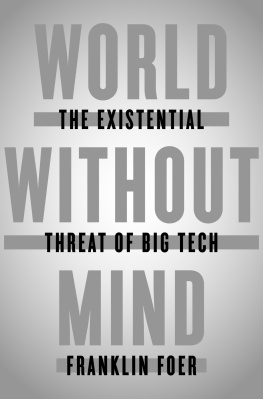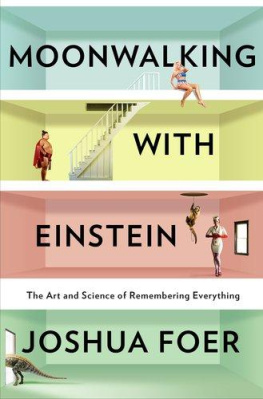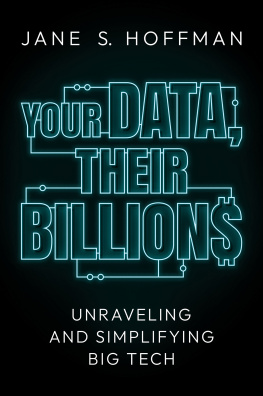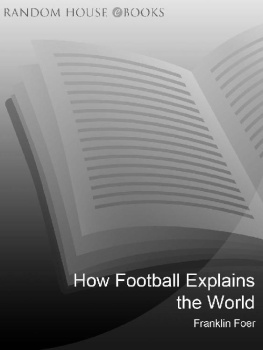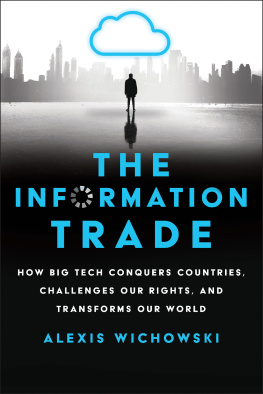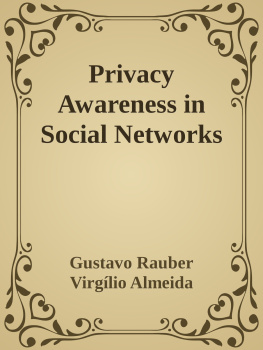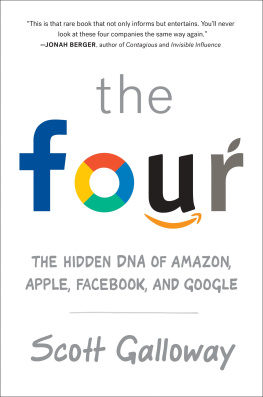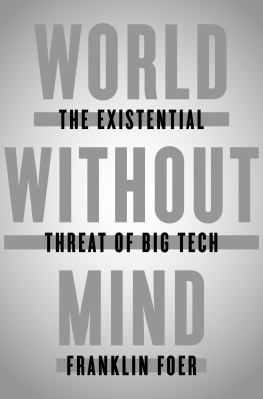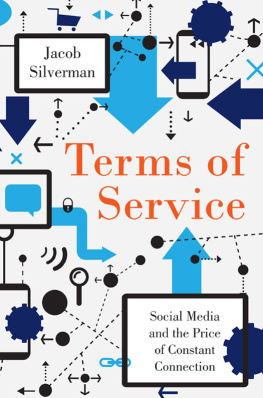ALSO BY FRANKLIN FOER
How Soccer Explains the World
AS EDITOR
Jewish Jocks (with Marc Tracy)
Insurrections of the Mind
PENGUIN PRESS
An imprint of Penguin Random House LLC
375 Hudson Street
New York, New York 10014
penguin.com
Copyright 2017 by Franklin Foer
Penguin supports copyright. Copyright fuels creativity, encourages diverse voices, promotes free speech, and creates a vibrant culture. Thank you for buying an authorized edition of this book and for complying with copyright laws by not reproducing, scanning, or distributing any part of it in any form without permission. You are supporting writers and allowing Penguin to continue to publish books for every reader.
LIBRARY OF CONGRESS CATALOGING-IN-PUBLICATION DATA
Names: Foer, Franklin, author.
Title: World without mind: the existential threat of big tech / Franklin Foer.
Description: New York: Penguin Press, [2017] | Includes bibliographical references and index.
Identifiers: LCCN 2017008656 (print) | LCCN 2017020819 (ebook) | ISBN 9781101981139 (ebook) | ISBN 9781101981115 (hardcover)
Subjects: LCSH: TechnologySocial aspects. | Information services industrySocial aspects.
Classification: LCC T14.5 (ebook) | LCC T14.5 .F63 2017 (print) | DDC 303.48/3dc23
LC record available at https://lccn.loc.gov/2017008656
Version_1
T O B ERT F OER
Ardent Trustbuster, Gentle Father
The glow of one warm thought is to me worth more than money.
Thomas Jefferson, 1773
CONTENTS
PROLOGUE
UNTIL RECENTLY, it was easy to define our most widely known corporations. Any third grader could describe their essence. Exxon sells oil; McDonalds makes hamburgers; Walmart is a place to buy stuff. This is no longer so. The ascendant monopolies of today aspire to encompass all of existence. Some of these companies have named themselves for their limitless aspirations. Amazon, as in the most voluminous river on the planet, has a logo that points from A to Z; Google derives from googol, a number (1 followed by 100 zeros) that mathematicians use as shorthand for unimaginably large quantities.
Where do these companies begin and end? Larry Page and Sergey Brin founded Google with the mission of organizing all knowledge, but that proved too narrow. Google now aims to build driverless cars, manufacture phones, and conquer death. Amazon was once content being the everything store, but now produces television shows, designs drones, and powers the cloud. The most ambitious tech companiesthrow Facebook, Microsoft, and Apple into the mixare in a race to become our personal assistant. They want to wake us in the morning, have their artificial intelligence software guide us through the day, and never quite leave our sides. They aspire to become the repository for precious and private items, our calendar and contacts, our photos and documents. They intend for us to unthinkingly turn to them for information and entertainment, while they build unabridged catalogs of our intentions and aversions. Google Glass and the Apple Watch prefigure the day when these companies implant their artificial intelligence within our bodies.
More than any previous coterie of corporations, the tech monopolies aspire to mold humanity into their desired image of it. They believe that they have the opportunity to complete the long merger between man and machineto redirect the trajectory of human evolution. How do I know this? Such suggestions are fairly commonplace in Silicon Valley, even if much of the tech press is too obsessed with covering the latest product launch to take much notice of them. In annual addresses and townhall meetings, the founding fathers of these companies often make big, bold pronouncements about human naturea view of human nature that they intend to impose on the rest of us.
Theres an oft-used shorthand for the technologists view of the world. It is assumed that libertarianism dominates Silicon Valley, which isnt wholly wrong. High-profile devotees of Ayn Rand can be found there. But if you listen hard to the titans of tech, thats not the worldview that emerges. In fact, it is something much closer to the opposite of a libertarians veneration of the heroic, solitary individual. The big tech companies believe were fundamentally social beings, born to collective existence. They invest their faith in the network, the wisdom of crowds, collaboration. They harbor a deep desire for the atomistic world to be made whole. By stitching the world together, they can cure its ills. Rhetorically, the tech companies gesture toward individualityto the empowerment of the userbut their worldview rolls over it. Even the ubiquitous invocation of users is telling, a passive, bureaucratic description of us.
The big tech companiesthe Europeans have charmingly, and correctly, lumped them together as GAFA (Google, Apple, Facebook, Amazon)are shredding the principles that protect individuality. Their devices and sites have collapsed privacy; they disrespect the value of authorship, with their hostility to intellectual property. In the realm of economics, they justify monopoly with their well-articulated belief that competition undermines our pursuit of the common good and ambitious goals. When it comes to the most central tenet of individualismfree willthe tech companies have a different way. They hope to automate the choices, both large and small, that we make as we float through the day. Its their algorithms that suggest the news we read, the goods we buy, the path we travel, the friends we invite into our circle.
Its hard not to marvel at these companies and their inventions, which often make life infinitely easier. But weve spent too long marveling. The time has arrived to consider the consequences of these monopolies, to reassert our own role in determining the human path. Once we cross certain thresholdsonce we transform the values of institutions, once we abandon privacytheres no turning back, no restoring our lost individuality.
OVER THE GENERATIONS, weve been through revolutions like this before. Back so many years ago, we delighted in the wonders of television dinners and the other newfangled foods that suddenly filled our kitchens: plastic-encased slices of cheese, oozing pizzas that emerged from a crust of ice, bags of crunchy tater tots. In the history of man, these seemed breakthrough innovations. Time-consuming tasksshopping for ingredients; each of those tedious steps in a recipe, with their trail of collaterally crusted pots and panswere suddenly and miraculously consigned to history.
The revolution in cuisine wasnt just enthralling. It was transformational. New products embedded themselves deeply in everyday life, so much so that it took decades for us to understand the price we paid for their convenience, efficiency, and abundance. These foods were feats of engineering all rightbut they were engineered to make us fat. Their delectable taste required massive quantities of sodium and sizable stockpiles of lipids, which happened to reset our pallets and made it harder to sate hunger. It took vast new quantities of meat and corn to fabricate these dishes, a spike in demand that re-created the very essence of American agriculture and exacted a terrible environmental toll. A whole new system of industrial farming emerged, with penny-conscious conglomerates cramming chickens into feces-covered pens and stuffing them full of antibiotics. By the time we came to understand the consequences of our revised patterns of consumption, the damage had been done to our waistline, longevity, soul, and planet.

